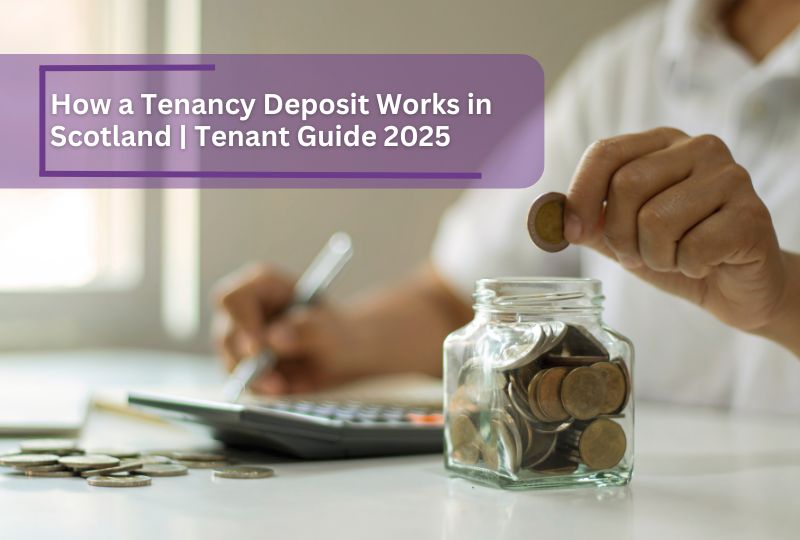Renting is becoming more and more popular in Scotland and across the UK too. In fact, by 2025, it’s expected that around 60% of people in London will be renting their homes. This growing trend shows just how common renting has become, so if you’re planning to rent a house in Scotland, you’re definitely not alone.
But before you pack your bags and start decorating your new place in your head, it’s important to understand what documents you need to rent a house in the UK. Renting a property in the UK involves a few key steps, and having the right paperwork ready can make the whole process much easier. This usually includes proof of identity, details of your income or employment, bank statements, and credit history records. Being prepared with these documents can help your application move faster and stand out to landlords.
Knowing which documents you need can make renting in the UK much simpler and stress-free. Keep reading to learn exactly what to prepare so your application goes smoothly and confidently.
Why Documentation Matters When Renting a House in the UK
Renting a property in Scotland involves a clear set of legal requirements and pre-tenancy checks to protect both landlords and tenants. Having the right documents, including proof of your ability to manage rent payments and your credit history, is vital for a smooth process. Unlike the rest of the UK, Scotland operates under the Private Residential Tenancy (PRT) system, introduced in 2017, which has its own specific rules. Proper documentation simplifies your rental journey by allowing landlords to verify your identity, income and employment status, and past rental reliability. This ensures you can maintain consistent rent payments, safeguarding the landlord’s interests while establishing a clear foundation for the tenancy agreement.
Key Documents You Need to Rent a House in the UK
Ensuring you meet the letting criteria and have the necessary documents, such as the deposit, inventory checks, and compliance with local authority regulations, is essential in protecting the renter’s rights, whether you’re renting from a private landlord or a housing association. If you’re wondering what documents you need to rent a house UK, here is the list of documents:
1. Proof of Identity

When renting a home in Scotland, landlords and letting agents need to confirm exactly who they’re dealing with. That’s why providing valid proof of identity is the first step. Even though Scotland doesn’t legally require Right to Rent checks like in England, most landlords still ask for ID, especially if you’re from outside the UK. While the Right to Rent scheme does not apply in Scotland, some landlords use it as an informal screening step. It helps verify your residency status and protects against any misunderstanding later.
- Accepted forms of ID include:
- A valid passport (UK or international)
- A UK photo driving licence
- A Biometric Residence Permit (for non-UK nationals)
- A National ID card (for EU, EEA, or Swiss citizens)
If you’re not a UK citizen, it’s also a good idea to bring immigration status documents that confirm your right to live and work in the UK. Landlords appreciate tenants who are transparent and well-prepared. Tenants arriving from abroad may still be asked about their Right to Rent eligibility, despite it not being mandatory in Scotland.
Also, More: How Easy Is It to Rent a Commercial Property as a First-Time Business?
2. Proof of Income and Employment

Demonstrating your financial stability is critical to assure landlords that you can manage rent payments consistently. Your income and employment status play a key role here, and landlords typically request specific documents to verify your financial capacity.
For Employed Tenants:
- Three most recent payslips to confirm your income level
- An employer reference letter verifying your job role, salary, and length of employment
- Your employment contract, particularly if you’ve just started a new position
For Self-Employed Tenants:
- Most recent tax return (SA302 form) issued by HMRC
- An accountant’s reference, if applicable, to validate your income
- Bank statements (personal or business) showing regular income and financial responsibility
- Lenders and agencies often ask self-employed applicants to clarify their employment status, especially when income varies month-to-month.
For Students or Tenants Without Regular Income:
While students are not excluded from renting under Scottish law, you may need to provide evidence of your ability to cover rent through other means. This might include:
- A university or college acceptance letter, confirming your full-time student status
- Student finance award letters or available grants to help cover housing costs
- A guarantor’s details, typically a parent or guardian, who agrees to cover rent if you are unable to pay rent.
If you want to know how much rent you can afford, you can use this simple rent affordability calculator to determine it on the basis of your income.
Additionally, landlords must provide an Energy Performance Certificate for the property and ensure carbon monoxide alarms are installed in rooms with fuel-burning appliances, as required by Scotland’s housing regulations. These safety measures, combined with thorough documentation, create a secure and transparent rental process for everyone involved.
3. Character and Employment References

References give landlords a clearer picture of your suitability and reliability as a tenant. While not legally required in Scotland, they’re often part of the tenant vetting process, especially when working through letting agents or renting in competitive areas. You may be asked to provide:
Landlord References:
- Confirms whether you paid rent on time
- Verifies that you maintained the property in good condition
- Indicates whether you received your full deposit back
- Additionally, ask your previous landlord to include their contact details so your potential landlord can easily follow up if needed. Some landlords ask that references be sent directly to the landlord or letting agent to ensure authenticity.
Employer References:
- Confirms your job title, salary, and type of employment contract
- Demonstrates financial stability and job security, particularly important for longer-term leases
Character References (if applicable):
- Ideal for first-time renters, students, or those without a rental history
- It should come from someone reputable, such as a teacher, mentor, or professional colleague, who can vouch for your responsibility
4. Credit Check Authorization

When you rent a property in Scotland, the landlord or letting agent will usually do a credit check to see if you have a good record of paying bills on time. This helps them know if you can manage the rent regularly. To make sure your details are correct, they may also ask for a recent utility bill in your name. This document confirms your current address and gives them extra proof that the information you provided is accurate.
What landlords look for in credit checks:
- Your payment history: This shows whether you’ve paid bills, credit cards, or loans on time in the past. A clean payment record tells the landlord you’re likely to pay your rent on time, too.
- Any unpaid debts or defaults: If you’ve missed payments or have unpaid loans, these might appear as defaults. That doesn’t automatically mean your application will be rejected, but it might raise concerns, especially if there are multiple defaults or large amounts owed.
- Court judgements or bankruptcies: If you’ve had any County Court Judgements (CCJs) or have declared bankruptcy in the past, these can also show up. Again, it’s not always a dealbreaker, but landlords and agents usually want an explanation, and they may ask you to provide a guarantor as extra security.
- Stable Credit Score: A stable score suggests you manage your finances responsibly—paying bills on time, avoiding excessive debt, and maintaining good credit habits. Landlords view this as a sign that you’re likely to pay your rent reliably and on time.
Landlords use credit checks to avoid complications such as late payments, disputes, or potential evictions, which in Scotland can be time-consuming and legally complex, often involving formal notices and applications to the First-tier Tribunal. A strong credit score, along with verified proof of address like a utility bill, reassures landlords that you’re financially responsible and pay on time.
All tenancy deposits in Scotland must be registered under one of the government-approved deposit protection schemes, such as SafeDeposits Scotland. This ensures your money is legally protected and can be fairly returned at the end of the tenancy.
5. Guarantor Information (if applicable)

Having a guarantor can boost your rental application, especially if you’re a student, first-time renter, or have an unstable income. A guarantor agrees to pay the rent if you’re unable to, giving landlords extra confidence in your reliability. If your employment status is temporary or part-time, a guarantor may be required to support your application. Guarantors usually need to provide:
- Proof of income
- ID verification
- Possibly a credit check
Choosing a guarantor who has a strong and stable financial background can greatly strengthen your rental application. If your credit score is below average, having a guarantor with good credit can improve your chances. It shows the landlord that there is a safety net in place, reducing their risk and increasing your chances of securing the property you want. If you think you might need a guarantor, it’s a good idea to discuss this with potential candidates early in your rental search so they can be prepared to support your application. In many cases, guarantors must be listed on the final tenancy agreement and accept legal responsibility.
6. Pet Documentation (if applicable)

When renting in Scotland, if you have a pet, your landlord has the right to ask for additional details before approving your tenancy. While not all landlords in Scotland allow pets, those who do may want reassurance that your pet won’t cause damage or disturb neighbours. A landlord or letting agent may request written confirmation that your pet is well-trained and will not damage the property. So, it’s quite common for them to request some form of pet documentation to support your application.
Here’s what they might ask you to provide:
- A Pet Resume: Think of this as a short profile for your pet. It should include key details like your pet’s name, age, breed, size, and temperament. If your pet has lived in rental homes before, mention that too, especially if there were no issues. This helps landlords feel confident about accepting your pet.
- Veterinary Records: Providing your pet’s medical history shows that you take good care of them and keep vaccinations up to date. If your pet is microchipped or neutered/spayed, be sure to include that—these are signs of a responsible pet owner.
- Pet Insurance Information: Some landlords appreciate seeing proof of pet insurance, especially if it covers accidental property damage. While this may not be mandatory, it adds an extra layer of security for the landlord and shows you’ve thought ahead.
7. Contact Details and Communication Preferences

Clear and accurate contact details are crucial during the rental process. Landlords and letting agents need to stay in touch for updates, viewings, contract discussions, and urgent communication. Make sure to provide your full name, current address, phone number, and a valid email address. Always confirm with the landlord or letting agent how they prefer to receive and process your documents. It’s also helpful to specify your preferred method of communication—whether it’s email, phone, or text—so nothing important is missed.
Providing correct and up-to-date contact information shows you’re organized and serious about securing a tenancy, which can leave a positive impression on landlords or agents.
8. Proof of Address
When applying to rent a home, landlords and letting agents usually ask for proof of your current address to confirm your identity. This is an important part of meeting the tenancy requirements and completing your rental application form. Commonly accepted documents include recent utility bills (like electricity, gas, or water), bank or credit card statements, council tax bills, or official letters from government agencies dated within the last three months. Providing accurate and up-to-date rental documentation shows you’re organised and helps speed up the application process.
What is the Usual Timeframe for Rental Application Approval in UK?
In Scotland, once you have submitted your rental documents, it generally takes at least 3 days for approval. If you are going through a letting agency, the process may take about 5-7 days for background and credit checks, as well as references. Private landlords approve tenants in 3-5 days if all the documents are in order. However, this may take longer if a guarantor is required or in complications relating to references or credit checks. In most instances, you can hear back within 3-7 days after submitting all your paperwork.
Key Factors Affecting Approval Time
- Letting Agencies vs. Private Landlords: Letting agencies take 5-10 days for background and reference checks, while private landlords may approve tenants within 24-48 hours if all documents are in order.
- Reference & Credit Checks: Quick responses from references can help to accelerate the process. while credit checks are usually instant but may take longer if issues arise.
- Guarantor Approval: If required a guarantor, verification can take an additional 3-5 days.
- Tenant Demand & Agency Workload: Letting agents may take longer to approve your rental application during peak periods.
- Holding Deposit Confirmation: If you delay paying the holding deposit, you may slow down the rental approval process.
Ready to Start Your Rental Journey with Westport Property?
By gathering all your rental documentation from ID and proof of income to references and your completed rental application form before you start viewing properties, you’ll be ready to meet any tenancy requirements quickly. This preparation puts you in a stronger position to secure your ideal rental property without unnecessary delays.
Visit Westport Property to explore available properties and get professional assistance with your rental application. Our team of experts is here to guide you through every step of the process, ensuring a smooth transition into your new home.
Don’t let paperwork hold you back from finding your perfect rental property. With this comprehensive guide, you now have the knowledge and tools to gather the documents you need to rent a house in the UK. Start your search today and make your dream home a reality!
Visit Westport Property. We are an industry-leading letting agent and property management company in Dundee. Contact us now to browse our latest listings and receive personalised support for your rental journey. Let us help you find your ideal home in the UK!
Have A Question or Need Some Help?
Whether you're searching for the perfect rental property or a landlord wanting advice on letting, we're here to assist. Feel free to call our office or send us an email, and we'll be happy to help you with any queries you may have.
FAQs:
Do I need a UK bank account to rent a property in Scotland?
No, it’s not legally required to have a UK bank account, but most landlords prefer it. Rent payments are easier with a UK account due to standing orders and local transfers. Opening one early simplifies the rental process, especially for newcomers.
Can I rent a property in Scotland if I don’t have a job yet?
Yes, you can rent without a job if you show financial security. Landlords may accept savings, a guarantor, or student loans as proof. Some might request several months’ rent in advance.
What happens if I fail a credit check?
Failing a credit check doesn’t automatically mean your rental application will be rejected. Many landlords are willing to consider other options—such as having a guarantor with a strong financial background or offering several months’ rent in advance. It’s important to be upfront and speak with your letting agent to explore the alternatives available in your specific case.
What if I fail a tenant reference?
If you fail a tenant reference whether due to gaps in your rental history, income concerns, or unclear references—the final decision still lies with the letting agent or landlord. They may consider additional supporting documents, a guarantor, or explanations that clarify the situation. Open communication with the letting agent can often help find a workable solution.
Are international students allowed to rent without a UK guarantor?
Yes, but landlords often ask for several months’ rent upfront. You can also strengthen your application with scholarship letters, funding proof, or university documents. Some agents accept international guarantor services.
Can I rent a property in Scotland with a temporary visa?
Yes, renting on a temporary visa is allowed. You’ll need to show documents like a Biometric Residence Permit or visa. The lease term might reflect the length of your stay.
Can I provide foreign documents if I’m moving from abroad?
Yes, you can use international documents like your passport, bank statements, and landlord or employer references. Just make sure to also include an immigration status document to prove your right to live and rent in the UK.
What if I have no rental history or references?
If you have no rental history or references, don’t worry—you can still strengthen your application in other ways. Providing a character reference from a teacher, employer, or mentor can help show you’re responsible. You can also offer proof of stable income or include a guarantor to reassure the landlord. If you’ve stayed in temporary or international accommodations, even those landlord contact details can support your case.
Is tenant insurance required when renting in Scotland?
Tenant insurance isn’t mandatory, but it’s strongly recommended. It protects your belongings against theft, fire, and damage. Some landlords may require it for furnished properties.
What documents do I need for a joint tenancy application?
Each tenant must provide their own ID, proof of income, and references. Landlords assess all tenants to ensure the combined income covers the rent. A joint guarantor may be needed if income or credit is insufficient.
How far in advance should I prepare my rental documents?
Prepare your documents 2–4 weeks before starting your property search. This allows quick application when a suitable property becomes available. Organised applicants often have a competitive advantage.
Do letting agents charge fees for processing rental documents?
No, letting agents in Scotland cannot charge tenants admin or application fees. This includes referencing, credit checks, and tenancy agreements. Such charges are illegal under Scottish law.
Can I sign a rental agreement digitally in Scotland?
Yes, digital signing of tenancy agreements is legal and widely used. Most landlords and agents accept electronic signatures via secure platforms. This makes renting faster and easier, especially from abroad.



 Find a Property Sale/Rent
Find a Property Sale/Rent  Letting Agents
Letting Agents  Asset Management
Asset Management 






